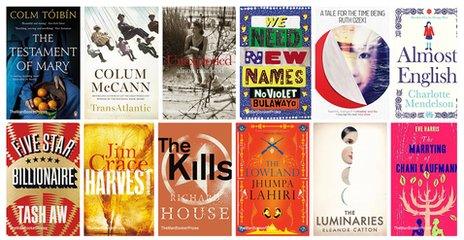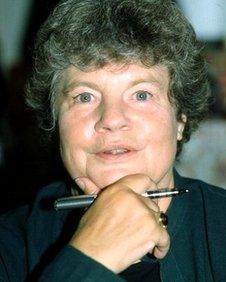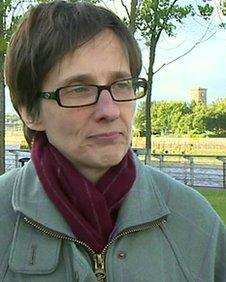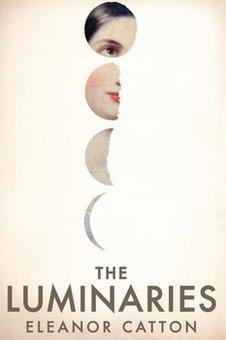'A surprise and a risk': Reaction to Booker Prize upheaval
- Published

The 12 books on this year's Booker Prize longlist. How would they have differed under the new eligibility criteria?
An excellent idea, or a betrayal of British authors?
The decision to allow writers from around the world to compete for the Man Booker Prize has split the literary establishment.
Some have welcomed the expansion of the field. Others say American novelists will come to dominate the prize, previously awarded to English-language authors from the Commonwealth, including the UK, the Republic of Ireland and Zimbabwe.
Many more have noted that the newly established Folio Prize was about to announce its first shortlist, using a similar international criteria.
Authors, judges and experts told the BBC which side of the fence they fell on.
AS Byatt, former Booker judge and winner

Once described as the "patron saint of bookworms", AS Byatt won the Booker in 1990 for Possession: A Romance, a story about two academics who use their skills in textual analysis to uncover the story of a clandestine love affair between two Victorian poets.
She also served as a judge in 1974 - and that is the basis of her objection to the new rules.
"I am very strongly against this change," she told the BBC, "because it will make judging impossible.
"I remember judging a short-story prize where the organisers were so overwhelmed with the number of entries, they employed sifters to reduce the number to an amount they thought the judges could read.
"In that instance, the winner was not someone picked by the sifters.
"I had to go back and ask for his entry because I knew of his work.
"So my worry is that good work may not be picked out."
Byatt thinks the number of entries from Britain, Ireland and the Commonwealth will have to be restricted to avoid overwhelming the judges, and is against the practice of publishing a longlist "because it depresses sales and spirits for any author" not featured.
Most of all, she fears that, by tinkering with the entry criteria, the Booker has diluted its identity.
"It won't have the thoroughness that the Booker has had - it was very intelligently planned."
AL Kennedy, author and former Booker judge

"It is a little bit weird that Britain hasn't had an international prize," says AL Kennedy.
"Ireland does. America has some. It's always seemed a little bit churlish to not reward people for wanting to be published by a British publisher and write in English."
The writer, whose 2007 novel Day won the Costa Prize, was also a judge for the 1996 Booker, when Graham Swift's Last Orders took the title.
She says the literary award has had a "bumpy ride" over the past decade, and has undoubtedly felt the International Impac Dublin Literary Award and the Folio Prize nipping at its heels.
But she welcomes the decision to broaden its horizons.
"The wonderful thing about writing is that I can sit and I can read a Russian [novel] and be taken there. Or I can read about an old bloke or a dead fish - it doesn't matter. It's a field within which everything is possible.
"It's deeply international, deeply humane. It has no borders.
"It's lovely that the Booker is reaching out."
There could be an advantage for future nominees, too.
"I imagine they would get more prize money, potentially, if it was a very large international prize."
Prof John Mullan, former Booker judge

"It's a risk," says Prof Mullan, a literary critic who has judged the Best of the Booker in 2008 and the main prize in 2009.
"Although it appears to let in lots more good fiction, it risks diluting the identity of the prize, which has a strangely generous range and yet a curious kind of coherence."
The 45-year rule that the prize should go to a writer in the UK, Ireland or the Commonwealth "means that you get books, as in this year's shortlist, from all over the world that are bound together by common identity", he adds. "Bringing in American books might well risk diluting that."
"It's going to make it more and more likely that the competition is seen as a series of face-offs - a Ryder Cup of literature.
"It's going to be Toni Morrison versus Hilary Mantel, or Jonathan Franzen against Ian McEwan, and I think that's really unfortunate.
"The great thing about the prize is that there's always room in it for surprises.
"We shouldn't forget that, in 1981, when Salman Rushdie won with Midnight's Children, no-one had ever heard of him."
Anne Meadows, assistant editor at Granta books

Granta published Eleanor Catton's The Luminaries, which is on this year's shortlist
"Good novels will be overlooked," says Anne Meadows, assistant editor at Granta - who has concerns about the newly imposed restrictions on submitting entries to the Booker Prize.
Previously, any publisher could submit two novels for consideration. Under the new system, it will be one - unless they have had a book shortlisted in the previous five years.
"It means the prize will be dominated by big publishing houses who maybe aren't taking as many risks," says Ms Meadows. "It could make it incredibly elitist."
Editors at Granta had a hard task whittling down their catalogue to two books this year. Having to select just one, she says, would be a disservice to their writers.
"Publishers do not always bet on the correct horse," she argues. "It would be impossible for anyone to say, 'This is the best novel that we have'. Or at least it should be.
"If you're publishing brilliant writers, you're usually publishing a few of them."
On a positive note, Ms Meadows doesn't think Booker judges will be blinded by the leading lights of US literature.
"The Booker is very unpredictable and that is one of its great strengths," she says.
"It quite often eschews big names."
Dr David Brauner, Reader in English and American literature at Reading University

Dr Brauner welcomes the new rules, but describes them as "a commercial decision", designed to foil the Folio.
He says he would be "amazed" if US authors don't come to dominate the prize, "unless the panel are less than objective".
"I'm not impartial myself, I'm an American-ist, but it's been my view for many years... that there's really no comparison.
"Just on the microcosmic level of sentence-by-sentence the most exciting prose is being written by American writers.
"Even some of our most famous British writers would be the first to say that - people like Ian McEwan and Martin Amis and Julian Barnes.
"The people they are inspired by, by and large, are Americans."
Dr Brauner has drawn up a speculative list of the US novels that might have won the Booker in the 21st Century, had they been eligible.
It sees prominent authors such as Cormac McCarthy (The Road), Tony Morrison (A Mercy) and David Foster Wallace (The Pale King) named as potential winners.
Almost every time, says Dr Brauner, the US contenders outshine the actual winners.
"I believe the only Booker winner who might have triumphed even in the face of the American competition would have been Hilary Mantel with Wolf Hall in 2009.
"The fact that she was chosen again last year for her sequel to that novel, however, exposes the relative weakness of British fiction."
Andrew Holgate, Sunday Times literary editor
"I think there was some pressure on them from the Man Group, who sponsor the prize," says Andrew Holgate of the Sunday Times.
The story of the relaxed entry criteria "will be picked up in America", where it is guaranteed to "cause lots of argument", he says.
"That will be perfect for the Man Group. There's no such thing as bad publicity."
He concedes there will be "anxiety" about the influx of US authors, but states "British and Commonwealth authors can hold their own".
"There is an element of cultural cringe among British authors but if you look at it slightly more in-depth, Philip Roth has just retired and some of the other really big heavy hitters like Updike [and] Mailer have died.
In any case, he argues: "When they come over here, the American authors, they're not treated with as much respect."
Andrew Kidd, founder of the Folio Prize

The Folio was announced in 2011, somewhat controversially, as a counterpoint to the Booker, which had declared an intention to focus on "readability".
It was, until today, the only major literary prize open to writers from all over the world.
Founder Andrew Kidd admits he was "a little surprised" by the Booker committee's move, "because when we created the Folio Prize, it was because we perceived a gap".
"Whether or not this is directly a response to us, I'm sure it's something they have been thinking of on-and-off over the years," he told the BBC.
"We'll just have to wait and see whether it's the right decision."
Mr Kidd said the Booker's "impressive" profile in the US might suffer if it lost its intrinsic "Britishness" and became harder to distinguish from the Pulitzer Prize.
But he was philosophical about the competition between the Booker and the Folio, which hands out its first award in January 2014.
"There's room for both of us," he said, stressing that the Folio "is the only prize where writers are solely judged by their peers" in the writing world.
- Published18 September 2013
- Published11 September 2013
- Published11 September 2013
- Published10 September 2013